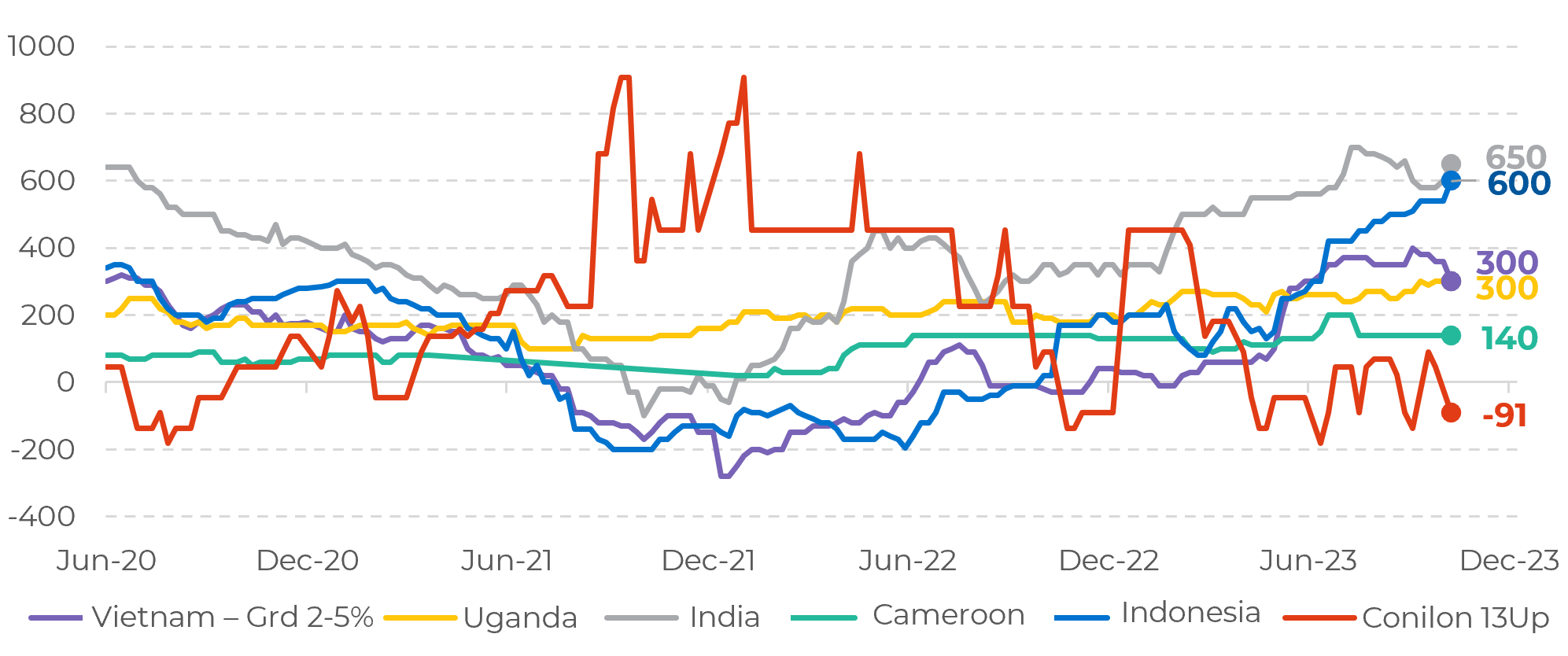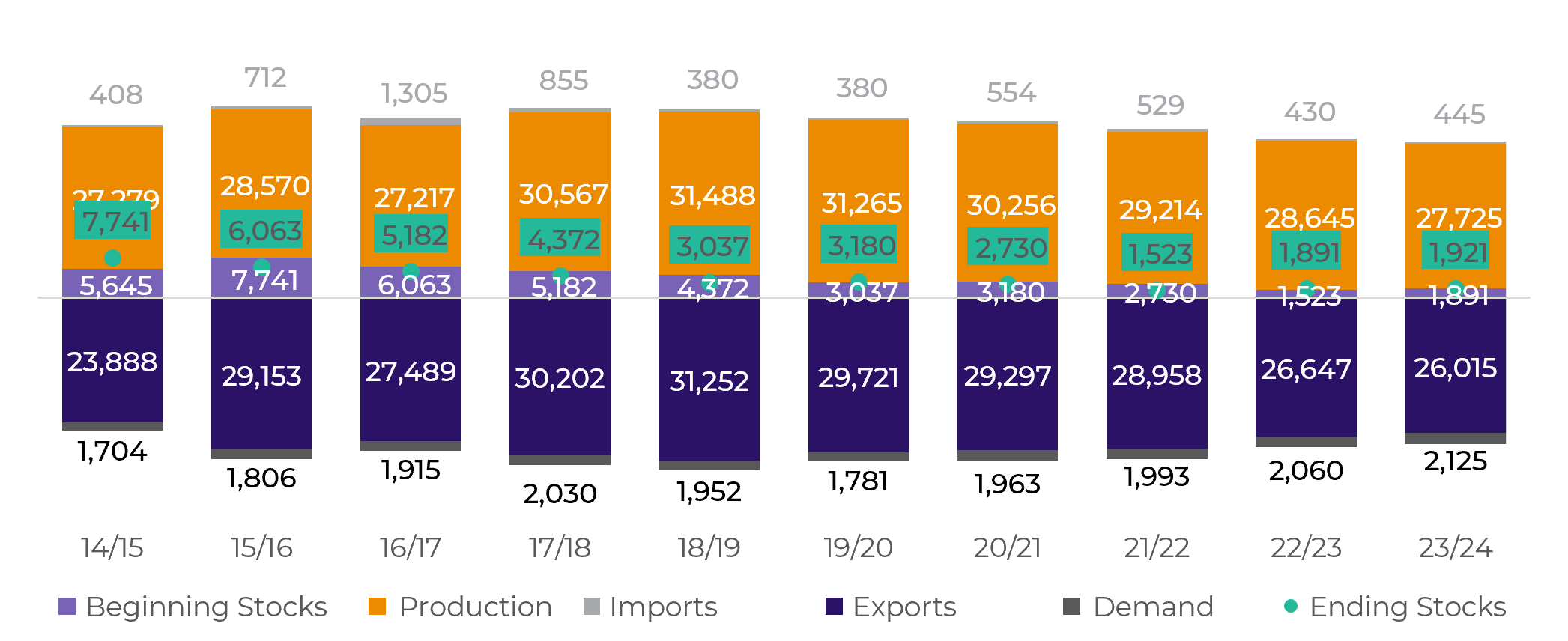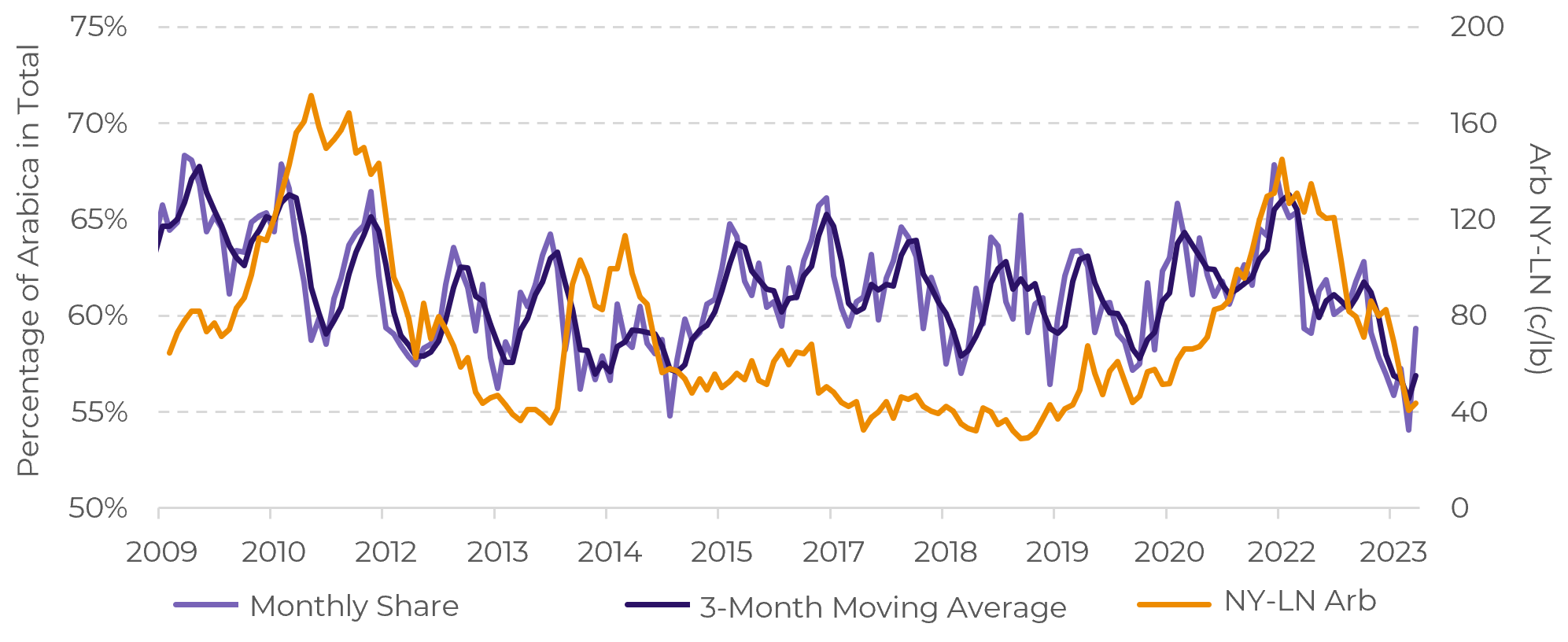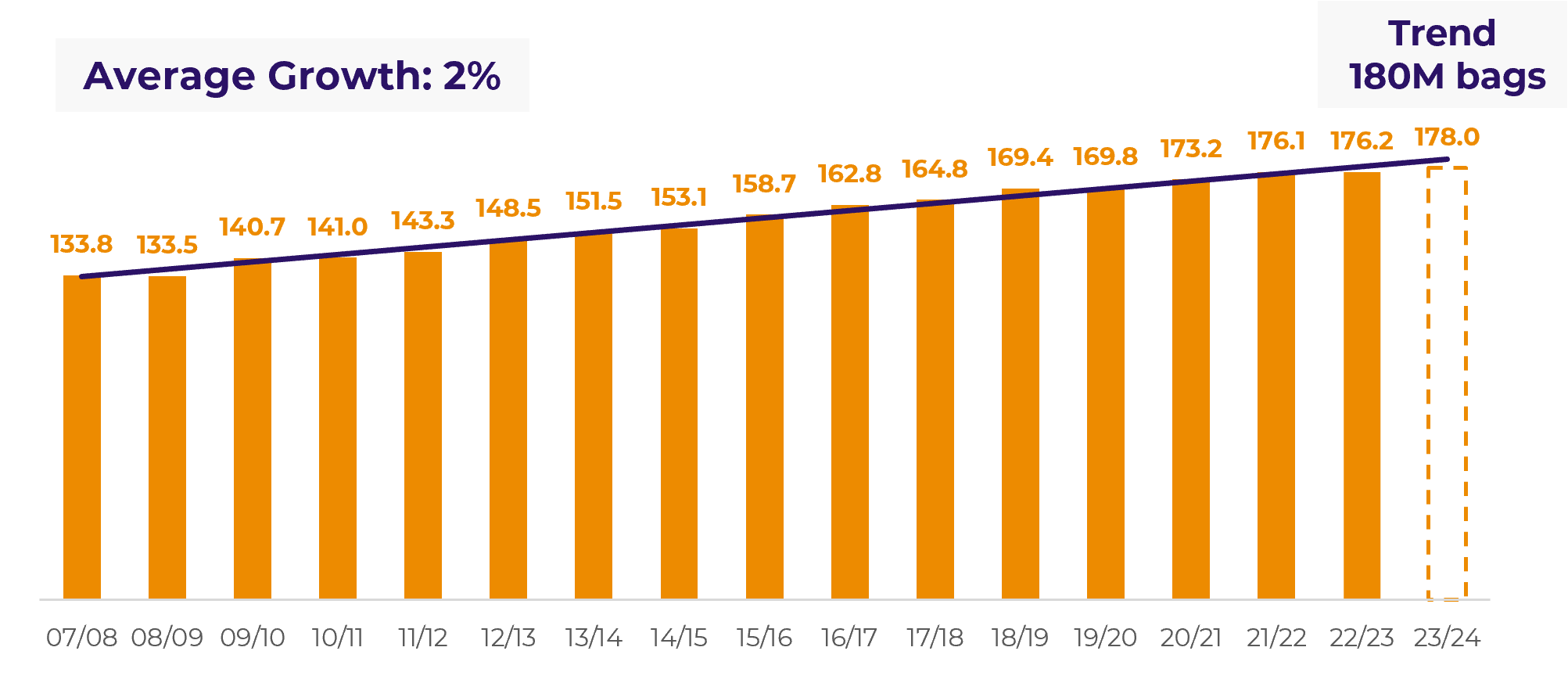
Nov 24
Coffee Weekly Report - 2023 11 24
Back to main blog page
- This analysis explores EU coffee imports, examining their impact on the NY-LN arbitrage and related factors.
- Many destinations have shifted to a higher robusta blend, influencing robusta suppliers. Vietnam, a key supplier, faces export challenges due to crop failures. The 23/24 cycle started with a 25% YoY export decline.
- With a potential record 24/25 harvest, Brazilian conilon remains a cost-effective robusta alternative.
- 23/24 consumption is forecasted to grow, albeit below the trend, and the EU is increasing Arabica imports, with a nearing 60% share.
- The relationship between arbitrage and Arabica use suggests a potential recovery in the NY-LN arbitrage. The EU's renewed interest in arabica may contribute to arbitrage upside potential in 2024.
Analyzing destination dynamics and arbitrage trends
In this report, we will dive into European Union imports and analyze how its recent marks, associated with other factors, can provide insights on the NY-LN arbitrage.
First, it is common knowledge by now that many coffee destinations have switched, if at least partially, to a higher share of robustas in their blend. From the supply side, there are two points to be considered: the main robusta supplier and its alternatives.
In Vietnam, the crop failure is being felt in exports (Chart #2). Despite strengthened differentials in the country, the crop failure in the 22/23 and 23/24 cycles is reflected in the exported volumes.
The first month of the 23/24 cycle already recorded a 25% year-on-year drop in exports, and we expect a further reduction of 2-3% in the country's exported volume during the cycle (on the low-end of estimates, it’s important to note).
Besides this scenario, conilon remains a more affordable alternative in the robusta market. The outlook for a record harvest in 24/25 may prolong this scenario throughout the year 2024 (Chart #1).
Image 1: Robusta/Conilon Differentials (USD/ton)

Source: Refinitiv, Safras & Mercado, hEDGEpoint
Image 2: Supply & Demand – Vietnam (‘000 bags)

Source: hEDGEpoint
On the demand side, consumption is expected to grow in 23/24, but below the trend (Chart #4).
According to historical trends, demand should reach 180 million bags in 23/24. However, with below-average growth in 22/23 and possibly in 23/24, consumption is expected to reach 178 million bags. Nevertheless, it is important to highlight that even with lower rates, demand remains resilient on a positive trajectory for the next cycle.
And when it comes to the blend expected for the next year, the European Union resumes purchasing more arabica (Chart #3), with the percentage of imported arabica approaching 60% in the latest available data for the third quarter.
It is important to highlight the relationship between arbitrage and arabica use. There is a clear yearly seasonality in arabica imports, however, a larger trend also can be seen through the years. More recently, the decrease in arabica demand from the European Union has deteriorated the NY-LN arbitrage. However, with the new recovery in arabica’s share within EU’s imports, it would stand to reason that the arbitrage has some upside potential moving into 2024.
Image 3: Percentage of Arabica in Total Imports – European Union, NY-LN Arb

Source: Eurostat, ICE, Refinitiv, hEDGEpoint
Image 4: Global Coffee Demand (M bags)

Source: hEDGEpoint
In Summary
This report delves into European Union coffee imports, assessing their implications for the NY-LN arbitrage and related factors. Many destinations have shifted to a higher robusta blend, impacting robusta suppliers.
Vietnam, a key supplier, faces export challenges due to crop failures. The 23/24 cycle started with a 25% YoY export drop, and a 2-3% reduction is expected. With a potential record 24/25 harvest, conilon remains a cost-effective robusta alternative.
On the demand side, 23/24 consumption is projected to grow, albeit below the trend. The EU is increasing arabica imports, with a near 60% share. The relationship between arbitrage and arabica use suggests potential recovery in the NY-LN arbitrage with the EU's renewed interest in arabica – although that dynamic is expected to play out in the long run.
Weekly Report — Coffee
Written by Natália Gandolphi
natalia.gandolphi@hedgepointglobal.com
natalia.gandolphi@hedgepointglobal.com
Reviewed by Lívea Coda
livea.coda@hedgepointglobal.com
www.hedgepointglobal.com
Disclaimer
This document has been prepared by hEDGEpoint Global Markets LLC and its affiliates ("HPGM") exclusively for informational and instructional purposes, without the purpose of creating obligations or commitments with third parties, and is not intended to promote an offer, or solicitation of an offer, to sell or buy any securities or investment products. HPGM and its associates expressly disclaim any use of the information contained herein that may result in direct or indirect damage of any kind. If you have any questions that are not resolved in the first instance of contact with the client (client.services@hedgepointglobal.com), please contact our internal ombudsman channel (ouvidoria@hedgepointglobal.com) or 0800-878-8408 (for clients in Brazil only).
Contact us
hedgepointhub.support@hedgepointglobal.com
ouvidoria@hedgepointglobal.com
Funchal Street, 418, 18º floor - Vila Olímpia São Paulo, SP, Brasil
Check our general terms and important notices.
This page has been prepared by Hedgepoint Schweiz AG and its affiliates (“Hedgepoint”) solely for informational and instructional purposes, without the purpose of instituting obligations or commitments to third parties, nor is it intended to promote an offer, or solicitation of an offer of sale or purchase relating to any securities, commodities interests or investment products. Hedgepoint and its associates expressly disclaim any use of the information contained herein that directly or indirectly result in damages or damages of any kind. Information is obtained from sources which we believe to be reliable, but we do not warrant or guarantee the timeliness or accuracy of this information. The trading of commodities interests such as futures, options, and swaps involves substantial risk of loss and may not be suitable for all investors. You should carefully consider wither such trading is suitable for you in light of your financial condition. Past performance is not necessarily indicative of future results. Customers should rely on their own independent judgement and/or advisors before entering in any transaction.Hedgepoint does not provide legal, tax or accounting advice and you are responsible for seeking any such advice separately.Hedgepoint Schweiz AG is organized, incorporated, and existing under the laws of Switzerland, is filiated to ARIF, the Association Romande des Intermédiaires Financiers, which is a FINMA-authorized Self-Regulatory Organization. Hedgepoint Commodities LLC is organized, incorporated, and existing under the laws of the USA, and is authorized and regulated by the Commodity Futures Trading Commission (CFTC) and a member of the National Futures Association (NFA) to act as an Introducing Broker and Commodity Trading Advisor. HedgePoint Global Markets Limited is Regulated by the Dubai Financial Services Authority. The content is directed at Professional Clients and not Retail Clients. Hedgepoint Global Markets PTE. Ltd is organized, incorporated, and existing under the laws of Singapore, exempted from obtaining a financial services license as per the Second Schedule of the Securities and Futures (Licensing and Conduct of Business) Act, by the Monetary Authority of Singapore (MAS). Hedgepoint Global Markets DTVM Ltda. is authorized and regulated in Brazil by the Central Bank of Brazil (BCB) and the Brazilian Securities Commission (CVM). Hedgepoint Serviços Ltda. is organized, incorporated, and existing under the laws of Brazil. Hedgepoint Global Markets S.A. is organized, incorporated, and existing under the laws of Uruguay. In case of questions not resolved by the first instance of customer contact (client.services@Hedgepointglobal.com), please contact internal ombudsman channel (ombudsman@hedgepointglobal.com – global or ouvidoria@hedgepointglobal.com – Brazil only) or call 0800-8788408 (Brazil only).Integrity, ethics, and transparency are values that guide our culture. To further strengthen our practices, Hedgepoint has a whistleblower channel for employees and third-parties by e-mail ethicline@hedgepointglobal.com or forms Ethic Line – Hedgepoint Global Markets.Security note: All contacts with customers and partners are conducted exclusively through our domain @hedgepointglobal.com. Do not accept any information, bills, statements or requests from different domains and pay special attention to any variations in letters or spelling, as they may indicate a fraudulent situation.“HedgePoint” and the “HedgePoint” logo are marks for the exclusive use of HedgePoint and/or its affiliates. Use or reproduction is prohibited, unless expressly authorized by HedgePoint. Furthermore, the use of any other marks in this document has been authorized for identification purposes only. It does not, therefore, imply any rights of HedgePoint in these marks or imply endorsement, association or seal by the owners of these marks with HedgePoint or its affiliates.
We have updated our Terms & Conditions to reflect improvements to our platform, data handling practices, and the overall experience we provide to our clients.
To continue using the Hedgepoint HUB, please review and accept the updated terms.

